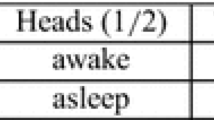Abstract
Hintikka and Sandu’s independence-friendly (IF) logic is a conservative extension of first-order logic that allows one to consider semantic games with imperfect information. In the present article, we first show how several variants of the Monty Hall problem can be modeled as semantic games for IF sentences. In the process, we extend IF logic to include semantic games with chance moves and dub this extension stochastic IF logic. Finally, we use stochastic IF logic to analyze the Sleeping Beauty problem, leading to the conclusion that the thirders are correct while identifying the main error in the halfers’ argument.
Similar content being viewed by others
References
Arntzenius, F., Some problems for conditionalization and reflection, Journal of Philosophy 100:356–370, 2003.
Blass, A., and Y. Gurevich, Henkin quantifiers and complete problems, Annals of Pure and Applied Logic 32:1–16, 1986.
Bradley, D., Sleeping Beauty: a note on Dorr’s argument for 1/3, Analysis 63:266–268, 2003.
Dorr, C., Sleeping Beauty: in defense of Elga, Analysis 62:292–96, 2002.
Elga, A., Self-locating belief and the Sleeping Beauty problem, Analysis 60:143–47, 2000.
Friedman, D., Monty Hall’s three doors: Construction and deconstruction of a choice anomaly, American Economic Review 88:933–946, 1998.
Gale, D., and F. M. Stewart, Infinite games with perfect information, in H. W. Kuhn, and A. W. Tucker, (eds.), Contributions to the Theory of Games II, volume 28 of Annals of Mathematics Studies, chapter 13. Princeton University Press, Princeton, NJ, 1953, pp. 245–266.
Galliani, P., Game values and equilibria for undetermined sentences of dependence logic. MSc thesis, ILLC Publications, MoL-2008-08, 2008.
Hintikka, J., The Principles of Mathematics Revisited, Cambridge University Press, Cambridge, 1996.
Hintikka, J., and G. Sandu, Informational independence as a semantical phenomenon, in J. E. Fenstad, I. T. Frolov, and R. Hilpinen, (eds.), Logic, Methodology and Philosophy of Science VIII, volume 126 of Studies in Logic and the Foundations of Mathematics, North-Holland, Amsterdam, 1989, pp. 571–589.
Hitchcock, C., Beauty and the bets, Synthese 139:405–420, 2004.
Horgan, T., Sleeping Beauty awakened: new odds at the dawn of the new day, Analysis 64:10–21, 2004.
Lewis, D., Sleeping Beauty: reply to Elga, Analysis 61:171–76, 2001.
Mann, A. L., G. Sandu, and M. Sevenster, Independence-Friendly Logic: A Game-Theoretic Approach. Number 386 in London Mathematical Society Lecture Note Series. Cambridge University Press, Cambridge, 2011.
Maschler, M., E. Solan, and S. Zamir, Game Theory, Cambridge University Press, New York, 2013.
Nash, J. F., Equilibrium points in \(n\)-person games, Proceedings of the National Academy of Sciences of the United States of America 36:48–49, 1950.
Nash, J. F., Non-cooperative games, The Annals of Mathematics 54:286–295, 1951.
Osborne, M. J., An Introduction to Game Theory, Oxford University Press, New York, 2004.
Osborne, M. J., and A. Rubinstein, A Course in Game Theory, MIT Press, Cambridge, Massachusetts, 1994.
Piccione, M., and A. Rubinstein, On the interpretation of decision problems with imperfect recall, Games and Economic Behavior 20:3–24, 1997.
Sandu, G., Languages for imperfect information, in J. van Benthem et al., (eds.), Models of Strategic Reasoning, volume 8972 of LNCS, Springer, Berlin, 2015, pp. 202–251.
Sevenster, M., and G. Sandu, Equilibrium semantics of languages of imperfect information, Annals of Pure and Applied Logic 161:618–631, 2010.
Tierney, J., And Behind Door No. 1, a Fatal Flaw New York Times April 8, 2008.
Tierney, J., Behind Monty Hall’s Doors: Puzzle, Debate and Answer?, New York Times July 21, 1991.
Väänänen, J., Dependence Logic: A New Approach to Independence Friendly Logic, Number 70 in London Mathematical Society Student Texts. Cambridge University Press, Cambridge, 2007.
von Neumann, J., Zur Theorie der Gesellschaftsspiele, Mathematische Annalen 100:295–320, 1928.
vos Savant, M., Ask Marilyn, Parade, September 8, 1990; December 2, 1990; February 17, 1991.
Acknowledgements
The first author wishes to gratefully acknowledge the partial support of the European Science Foundation EUROCORES program LogICCC [FP002–Logic for Interaction (LINT)] and the Academy of Finland (Grant 129208).
Author information
Authors and Affiliations
Corresponding author
Additional information
Presented by Yde Venema.
Rights and permissions
About this article
Cite this article
Mann, A.L., Aarnio, V. A Logical Analysis of Monty Hall and Sleeping Beauty. Stud Logica 106, 1123–1162 (2018). https://doi.org/10.1007/s11225-017-9777-1
Published:
Issue Date:
DOI: https://doi.org/10.1007/s11225-017-9777-1



